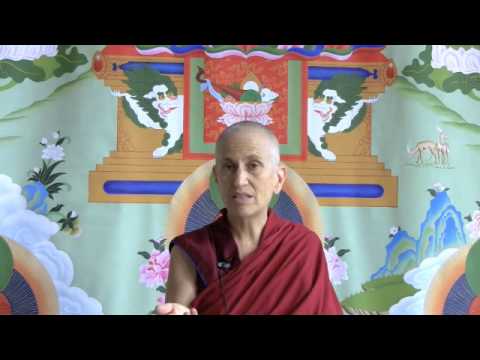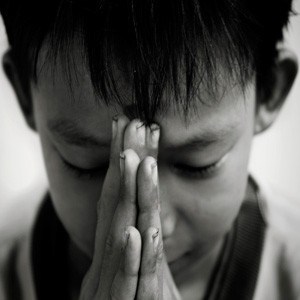Questions and answers about karma
Part of a series of Bodhisattva's Breakfast Corner talks on the Stages of the Path (or lamrim) as described in the Guru Puja text by Panchen Lama I Lobsang Chokyi Gyaltsen.
- Purifying past negative actions
- Becoming more aware of our misdeeds
Somebody who’s been listening wrote in some very good questions which I thought I would address today. The first one was,
If we abandon our non-virtuous actions, at least the ones we recognize, then will they ripen in our present lifetime, will they still ripen?
If we have done negative actions, even though we stop them, we still have to go back and do purification practices for the ones we did in the past. Stopping them now and so we don’t do them in the future is wonderful and extremely important, but those seeds from previous negativities have still been planted. For that reason it’s important to go back and do purification practices with the four opponent powers: regret, repairing the relationship, making the determination not to do it again, and then doing some remedial action.
The second question is,
How can we become more aware of our misdeeds when sometimes they are subtle but are profoundly affecting us?
How do we become more aware of all the misdeeds, especially the ones that we’re really out to lunch about? This is something, I think, that takes time and comes through doing a daily meditation practice, because as we do a daily meditation practice, we become more in touch with what we’re actually thinking, what we’re actually feeling. We come to look at the day’s activities and review what was going on, and so by that process of sitting down once or twice a day and really doing that and the process of consciously setting a motivation and then checking up and seeing how well we’re doing keeping it, all of this acts to help make us more attentive and mindful to what we’re actually doing and saying and thinking and feeling.
Also, as we we all know, when we’re doing our meditation practice, distractions come up and our distractions very often center around afflictive states of mind. We go to attachment, we go to anger, to jealousy, to arrogance. These happen to be the afflictions that set up the stories that we’re telling that are the distractions in our meditation. By noticing this and then seeing where our mind is going and what stories it’s getting hooked on, then that’s telling us right there what these misdeeds are that we need to look at because we can see the mental state and sometimes even in the distraction it’s all about he said/she said sometime in the past, and then we go back and explore that and was that situation involved with any of the ten non-virtues?
It’s very helpful if you’re having a distraction that’s really bothering you or some kind of worry that’s bothering you, something in the past, then to just think, “Okay, how does that relate to the ten non-virtues?” Because especially if we’re suffering from guilt, chances are it has to do with something we did in the past that we haven’t cleaned up yet, that we haven’t been mindful enough about to actually admit to having done. You know that one?
It’s also, as we’ve been talking a lot in the last retreat and last night at our discussion, about becoming more truthful and more authentic and more aware of our feelings and then owning them, acknowledging them to ourselves instead of sweeping them under the desk and pretending that everything’s okay, but all of this comes about, I think, through having a period of time each day where you’re actually sitting, because that helps you become more aware of what’s going on, and then I think also it seems that sometimes our discussion groups and retreats and our Dharma discussions are very helpful. Do people find that helpful for making you more aware of things that maybe you weren’t so aware of before?
Venerable Thubten Chodron
Venerable Chodron emphasizes the practical application of Buddha’s teachings in our daily lives and is especially skilled at explaining them in ways easily understood and practiced by Westerners. She is well known for her warm, humorous, and lucid teachings. She was ordained as a Buddhist nun in 1977 by Kyabje Ling Rinpoche in Dharamsala, India, and in 1986 she received bhikshuni (full) ordination in Taiwan. Read her full bio.


